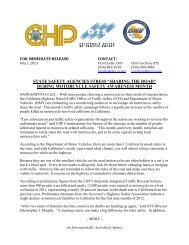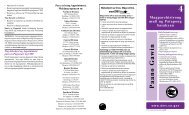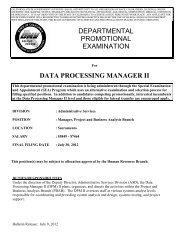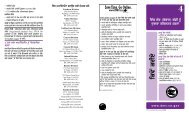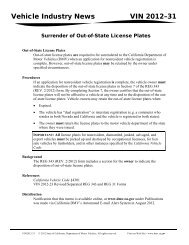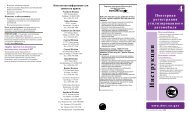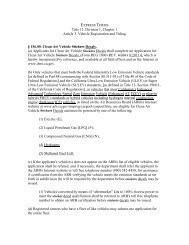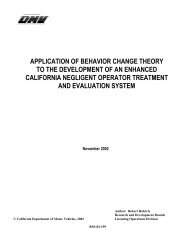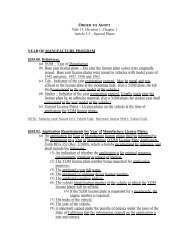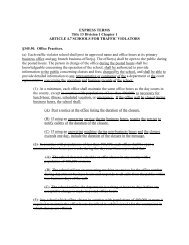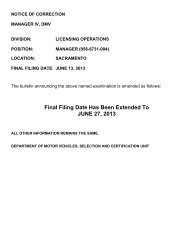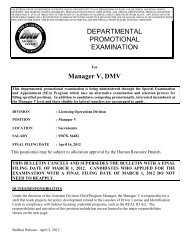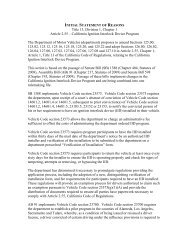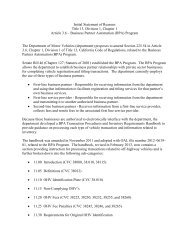Commercial Driver Handbook ( PDF ) - California Department of ...
Commercial Driver Handbook ( PDF ) - California Department of ...
Commercial Driver Handbook ( PDF ) - California Department of ...
You also want an ePaper? Increase the reach of your titles
YUMPU automatically turns print PDFs into web optimized ePapers that Google loves.
Radioactive materials. If a leak or broken package<br />
involves radioactive materials, notify your<br />
dispatcher or supervisor as soon as possible. If<br />
there is a spill, or if an internal container might<br />
be damaged, do not touch or inhale the material.<br />
Do not use the vehicle until it is decontaminated<br />
and checked with a survey meter.<br />
The National Response Center helps coordinate<br />
emergency response to chemical hazards. They<br />
are a resource to the local police and fire fighters.<br />
Their 24-hour toll free number is 1-800-424-8802<br />
or within <strong>California</strong>, 1-800-852-7550. The person<br />
in charge <strong>of</strong> a vehicle involved in a collision may<br />
have to phone the National Response Center. The<br />
call will be in addition to any made to police or fire<br />
fighters. You or your employer must phone when<br />
any <strong>of</strong> the following occurs as a direct result <strong>of</strong><br />
hazardous materials incident:<br />
• There is spill or release <strong>of</strong> a reportable quantity<br />
(RQ) hazardous substance.<br />
• A person is killed.<br />
• A person receives injuries requiring<br />
hospitalization.<br />
• Estimated carrier or other property damage<br />
exceeds $50,000.<br />
• The general public is evacuated for one or<br />
more hours.<br />
• One or more major transportation arteries or<br />
facilities are closed or shut down for one hour<br />
or more.<br />
• Fire, breakage, spillage, or suspected radioactive<br />
contamination occurs and/or involves<br />
a shipment <strong>of</strong> etiologic agents (bacteria or<br />
toxins).<br />
• A situation (e.g., continuing danger to life<br />
exists at the scene <strong>of</strong> an incident) that, in the<br />
judgment <strong>of</strong> the carrier, should be reported.<br />
- 128 -<br />
The person making the immediate telephone report<br />
should be ready to give:<br />
• His or her name.<br />
• Name and address <strong>of</strong> the carrier.<br />
• Phone number where someone can be reached.<br />
• Date, time, and location <strong>of</strong> incident.<br />
• The extent <strong>of</strong> injuries, if any.<br />
• Classification, name, and quantity <strong>of</strong> hazardous<br />
materials involved, if such information is<br />
available.<br />
• Type <strong>of</strong> incident and nature <strong>of</strong> hazardous substance<br />
involvement and whether a continuing<br />
danger to life exists at the scene.<br />
• If a reportable quantity <strong>of</strong> hazardous substance<br />
was involved, the caller should give the<br />
following:<br />
— the name <strong>of</strong> the shipper.<br />
— the quantity <strong>of</strong> the hazardous substance<br />
discharged.<br />
You should know these immediate reporting<br />
requirements so you can give your employer the<br />
required information. Carriers must also make<br />
detailed written reports within 30 days.<br />
The Chemical Transportation Emergency Center<br />
(CHEMTREC) in Washington D.C. also has a 24<br />
hour toll free line (1-800-424-9300). CHEMTREC<br />
was established to provide emergency personnel<br />
with technical information about the physical<br />
properties <strong>of</strong> hazardous products. The National<br />
Response Center and CHEMTREC are in close<br />
communication. If you call either one, they will<br />
tell the other about the problem, when appropriate.<br />
<strong>California</strong> immediate spill reporting<br />
Spills <strong>of</strong> hazardous materials on <strong>California</strong> highways<br />
must be reported immediately to the CHP<br />
<strong>of</strong>fice or police department having traffic control<br />
jurisdiction (CVC §23112.5).



